Recent Posts
The Importance of Hiring Certified Professionals for Fire Damage Restoration
4/17/2024 (Permalink)
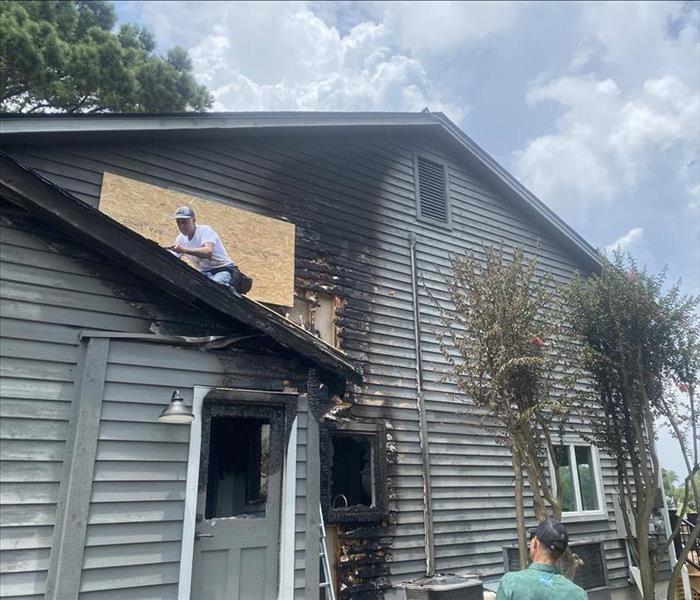 In this blog, we will highlight the importance of hiring certified professionals for fire damage restoration and discuss the benefits.
In this blog, we will highlight the importance of hiring certified professionals for fire damage restoration and discuss the benefits.
Experiencing a fire in your home or business is a devastating event. The process of restoring your property after fire and smoke damage requires expertise, specialized equipment, and knowledge of industry best practices. Hiring certified professionals for fire damage restoration is essential to ensure effective and efficient remediation. In this blog, we will highlight the importance of hiring certified professionals for fire damage restoration and discuss the benefits they bring to the restoration process, such as the experienced technicians at SERVPRO®.
Expertise and Knowledge
Certified fire damage restoration professionals possess the necessary expertise and knowledge to handle all aspects of fire damage remediation. They are trained in the latest techniques and best practices for each step of the restoration process, from assessing the extent of damage to implementing appropriate restoration methods. By hiring certified professionals, such as those from SERVPRO, you can be confident that your property is in capable hands.
Quick Response Time
A swift response is crucial in fire damage restoration to prevent further damage and increase the chances of successful restoration. Certified professionals understand the urgency and are equipped to respond promptly to mitigate the damage. Their quick response helps minimize additional losses and reduces the overall restoration time.
Specialized Equipment and Techniques
Certified fire damage restoration professionals have access to specialized equipment and techniques that are specifically designed for fire and smoke damage restoration. From industrial-grade air scrubbers to specialized cleaning agents, these professionals have the necessary tools to effectively remove soot, eliminate odors, and restore your property to pre-fire condition. Utilizing the correct equipment and techniques ensures thorough and efficient restoration.
Comprehensive Fire and Smoke Damage Assessment
Fire damage is not limited to what is visible on the surface. Certified professionals conduct a comprehensive assessment, examining both the visible and hidden damages caused by fire and smoke. They use advanced techniques and equipment, such as thermal imaging cameras, to identify areas that may have been affected, including structural elements, insulation, and HVAC systems. This thorough assessment ensures no damage goes unnoticed and allows for a comprehensive restoration plan.
Professional Restoration Plan
Certified professionals develop a tailored restoration plan based on their assessment findings. This plan outlines the necessary steps, timelines, and resources required to restore your property. Their expertise allows them to determine the most appropriate techniques and materials needed for each specific situation, ensuring efficient and effective restoration.
Efficient Restoration Process
By hiring certified professionals, you can expect an efficient restoration process. These professionals are experienced in working under tight deadlines and managing multiple tasks simultaneously. Their skill set and teamwork streamline the restoration process, allowing them to accomplish more in less time, minimizing disruptions to your home or business.
Insurance Assistance
Dealing with insurance claims after a fire can be overwhelming. Certified fire damage restoration professionals understand the insurance process and can assist you in navigating the complexities. They document the damage, provide detailed reports, and communicate directly with your insurance company, ensuring a smoother claims process.
Hiring certified professionals for fire damage restoration is vital for successful remediation and restoration after a fire. Their expertise, specialized equipment, and knowledge of industry best practices ensure efficient and effective restoration, minimizing further damage and reducing restoration time. Certified professionals, such as those from SERVPRO, possess the necessary skills and resources to handle fire and smoke damage restoration thoroughly. If you experience a fire, do not hesitate to contact certified fire damage restoration professionals to restore your property and help you rebuild your life.
Mold Prevention Tips for Every Homeowner
3/20/2024 (Permalink)
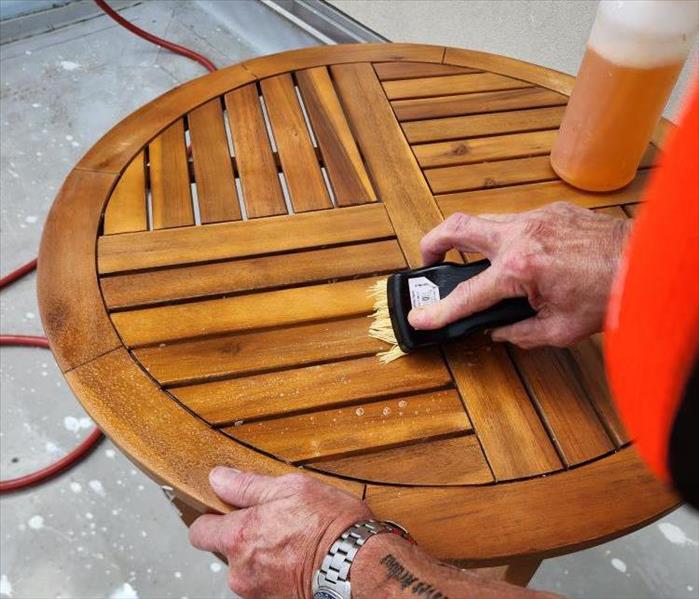 Remember, prevention is the key to maintaining a mold-free home, and a little effort today can save you from bigger problems down the line.
Remember, prevention is the key to maintaining a mold-free home, and a little effort today can save you from bigger problems down the line.
Welcome back to SERVPRO®, where we are committed to providing you with valuable information to help you maintain a mold neutral home. Today, we're tackling a common household concern that affects many homeowners – mold. Mold can be a persistent problem if not addressed promptly, leading to potential damage and costly repairs. In this blog post, we'll share some practical mold prevention tips to keep your home mold-free.
Maintain Proper Ventilation
One of the key factors in mold prevention is ensuring proper ventilation throughout your home. Mold thrives in damp and humid environments, so it's essential to keep your living spaces well-ventilated. Use exhaust fans in bathrooms and kitchens to reduce moisture levels, and make sure your home has adequate ventilation in crawl spaces and attics.
Monitor Indoor Humidity
Controlling indoor humidity is crucial in preventing mold growth. Aim to keep the indoor humidity level below 60%. Consider using dehumidifiers in areas prone to moisture, such as basements and attics. Regularly check and empty the dehumidifier's collection pan to prevent the buildup of excess water.
Fix Leaks and Water Intrusion
Addressing water leaks and intrusion promptly is vital in mold prevention. Inspect your home regularly for leaks in pipes, roofs, windows, and foundations. If you notice any signs of water damage, repair them immediately to prevent mold from taking hold.
Clean and Maintain Gutters
Clogged gutters can lead to water pooling around your home's foundation, creating a conducive environment for mold growth. Regularly clean and maintain your gutters to ensure proper water drainage away from the house. Consider installing gutter guards to prevent debris buildup.
Use Mold-Resistant Products
When renovating or building, opt for mold-resistant materials and products. Mold-resistant drywall, paints, and insulation can help mitigate the risk of mold growth in your home. While these products are not mold-proof, they can provide an added layer of protection.
Regularly Clean and Dust
Dust and debris can contribute to mold growth, especially in hidden corners and on surfaces. Regularly clean and dust your home, paying attention to often-neglected areas like the tops of cabinets, behind furniture, and inside closets. Vacuum with a HEPA filter to capture mold spores and prevent them from circulating in the air.
By incorporating these mold prevention tips into your routine, you can create a mold neautral living environment for you and your family. If you do encounter mold issues, don't hesitate to reach out to SERVPRO for professional mold remediation services. Remember, prevention is the key to maintaining a mold-free home, and a little effort today can save you from bigger problems down the line. Stay informed, stay proactive, and enjoy a mold-free living space!
How SERVPRO® Can Help You Restore Your Home After a Natural Disaster
2/20/2024 (Permalink)
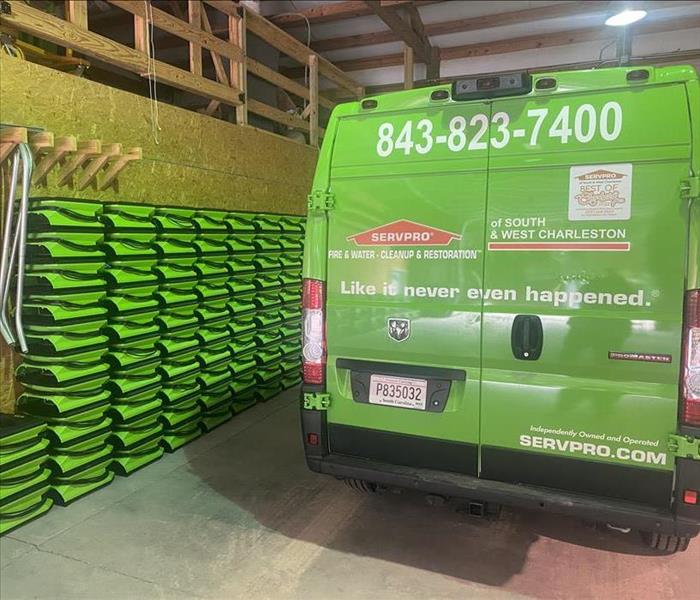 Trust SERVPRO – Your Partner in Disaster Restoration and Recovery.
Trust SERVPRO – Your Partner in Disaster Restoration and Recovery.
Natural disasters such as hurricanes, floods, wildfires, and tornadoes can wreak havoc on your home, leaving behind extensive damage and emotional distress. In this comprehensive guide, we'll walk you through expert tips for effectively restoring your home after a natural disaster strikes.
Safety First
Prioritize safety for yourself and your family. Depending on the severity of the damage, it's important to ensure it's safe to return before re-entering your home. Watch out for structural damage, electrical hazards, and other potential dangers. If unsure, seek professional assistance.
Assessment and Documentation
Assess the extent of the damage to your property. Document the damage thoroughly through photographs or videos for insurance claims. Take inventory of belongings and note any losses for insurance purposes.
Contact Your Insurance Provider
It's important to notify your insurance company immediately to initiate the claims process. Provide them with documented evidence of the damage. Understand your coverage and the steps required for filing a claim.
Professional Restoration Assistance
Engage the services of a professional restoration company like SERVPRO of South & West Charleston. Our certified experts specialize in disaster recovery and restoration. We possess the skills, equipment, and experience to efficiently restore your home to its pre-disaster condition.
Thorough Cleanup and Restoration
Our team at SERVPRO initiates a comprehensive cleanup process, removing debris, drying affected areas, mitigating mold, and restoring structural integrity. We employ advanced techniques to expedite the restoration while ensuring quality results.
Emotional Support and Assistance
Dealing with the aftermath of a natural disaster can be incredibly challenging emotionally. Lean on your support network and consider seeking professional assistance if needed. It's important to take care of yourself and your mental health while navigating the restoration process.
Preventative Measures and Preparedness
Learn from the experience and take proactive steps to prevent damage in the future. Implement disaster preparedness plans, secure important documents, and consider home modifications to help protect against any future disasters.
Restoring your home after a natural disaster is a difficult and overwhelming task, but with the right guidance and professional assistance, you can recover and rebuild. SERVPRO stands ready to support you throughout the restoration journey. Let our team help you bring your property back to life, ensuring a safe and secure environment for you and your loved ones.
Trust SERVPRO – Your Partner in Disaster Restoration and Recovery.
Storm Preparedness: Your Essential SERVPRO® Checklist
1/9/2024 (Permalink)
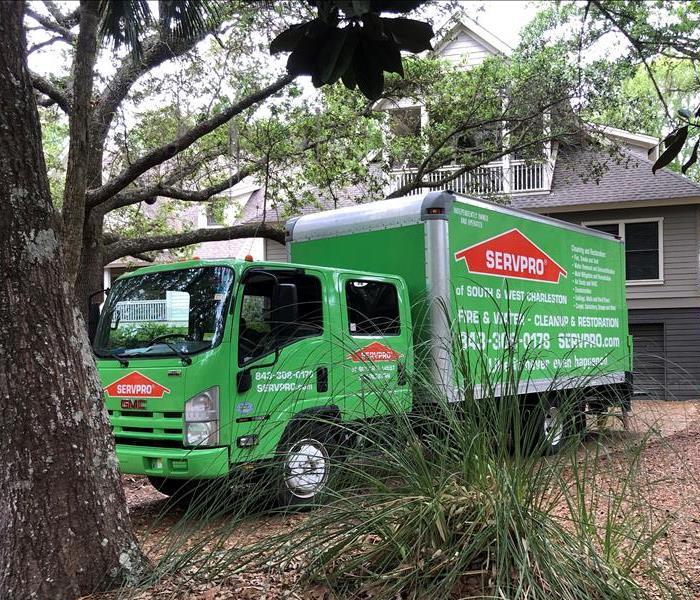 Storms can be devastating, causing significant damage to properties and a huge disruption in lives.
Storms can be devastating, causing significant damage to properties and a huge disruption in lives.
Storms can be devastating, causing significant damage to properties and a huge disruption in lives. Preparedness is our best defense against such unpredictable events. Our SERVPRO® team has curated an essential storm preparedness checklist to help you maintain safety and minimize potential damages.
1. Understand Your Risk
Different geographical locations pose various weather risks, so be aware of the typical weather-related threats in your area.
2. Home Inspection
Ensure your home is ready to withstand severe weather. Inspect your roofing, gutters, and drainage to confirm that they can handle a heavy downpour.
3. Emergency Kit
Build an emergency kit that includes:
- First aid supplies
- Prescription medicines
- Non-perishable food and drinking water
- Flashlights with extra batteries
- Cash and important documents
4. Plan for Evacuation
Be aware of your area's evacuation plan and the safest routes to reach the evacuation point.
5. Secure Outdoor Belongings
Outdoor items can become potential projectiles in a storm. Secure outdoor furniture, grills, and other objects that could be carried off by strong winds.
6. Install Surge Protectors
Power surges during storms can damage electronics. Surge protectors shield your electronic equipment from electricity spikes.
7. Remove Debris
Clear your yard of any debris like tree limbs or loose gravel that could cause damage during a storm.
8. Backup Your Data
Use cloud storage services or an external hard disk to back up critical information from your computers and other digital storage devices.
9. Insurance Review
Review your insurance policies before a storm to ensure coverage and understand weather-related damage clauses.
10. Document Your Property
Take pictures or videos of your property and belongings before the storm. This will help in case you need to file an insurance claim after storm damage.
Remember, SERVPRO is Here for You
If the storm leads to property damage, SERVPRO of South & West Charleston is here to help. Offering 24/7 emergency service, we specialize in storm damage restoration - making it "Like it never even happened." Plan ahead, stay safe, and remember you're never alone in recovery with us by your side.
5 Ways to Prevent a Fire in Your Home
12/11/2023 (Permalink)
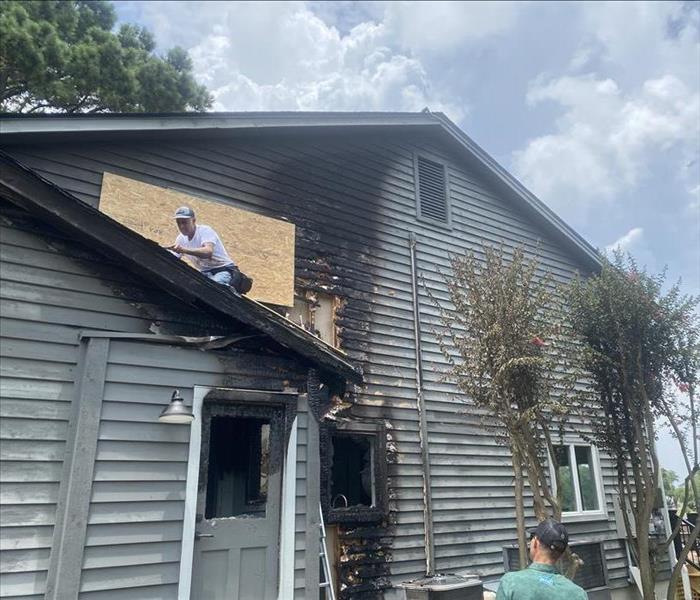 Preventing a fire in your home is a responsibility that every homeowner should take seriously.
Preventing a fire in your home is a responsibility that every homeowner should take seriously.
House fires can be devastating, causing damage to property and posing a serious risk to your loved ones. The good news is that many house fires are preventable with some proactive measures and awareness. In this blog, we'll explore five essential ways to prevent a fire in your home. By following these tips, you can significantly reduce the risk and ensure a safer living environment for you and your family.
Install and Maintain Smoke Alarms
Smoke alarms are your first line of defense against house fires. Install smoke alarms in key areas of your home, such as the kitchen, bedrooms, and hallways. Regularly test the alarms and replace their batteries at least once a year to ensure they're functioning properly. Smoke alarms can provide early warnings, giving you precious time to react in case of a fire.
Practice Safe Cooking Habits
Cooking is one of the leading causes of home fires. To prevent kitchen fires, never leave cooking unattended, keep flammable objects away from stovetops, and use a timer as a reminder. Always have a fire extinguisher in your kitchen and know how to use it. These simple precautions can help you avoid kitchen disasters.
Electrical Safety
Faulty electrical systems and appliances can be a fire hazard. Ensure that your home's electrical wiring is up to code and have a qualified electrician inspect it regularly. Avoid overloading outlets and use surge protectors to safeguard your electronics. Unplug appliances and devices when not in use to prevent electrical fires.
Proper Candle Usage
Candles can create a cozy atmosphere, but they are also a common source of home fires. If you enjoy using candles, keep them away from flammable materials, use sturdy candle holders, and never leave them unattended. Consider using flameless LED candles as a safer alternative.
Space Heater Safety
Space heaters can be useful for staying warm, but they can also pose a fire risk. Keep space heaters at least three feet away from flammable objects and always turn them off when you leave a room or go to sleep. Additionally, choose space heaters with safety features like tip-over protection and overheating sensors.
Preventing a fire in your home is a responsibility that every homeowner should take seriously. By following these five essential tips, you can significantly reduce the risk of a house fire. Remember, safety starts with awareness and proactive measures. Your diligence in fire prevention will not only protect your property but, more importantly, the lives of your family. For professional assistance with fire damage restoration or for more fire prevention tips, contact SERVPRO® of South & West Charleston experts. Your safety and peace of mind are our top priorities.
DIY Mold Removal vs. When to Call the Professionals
11/16/2023 (Permalink)
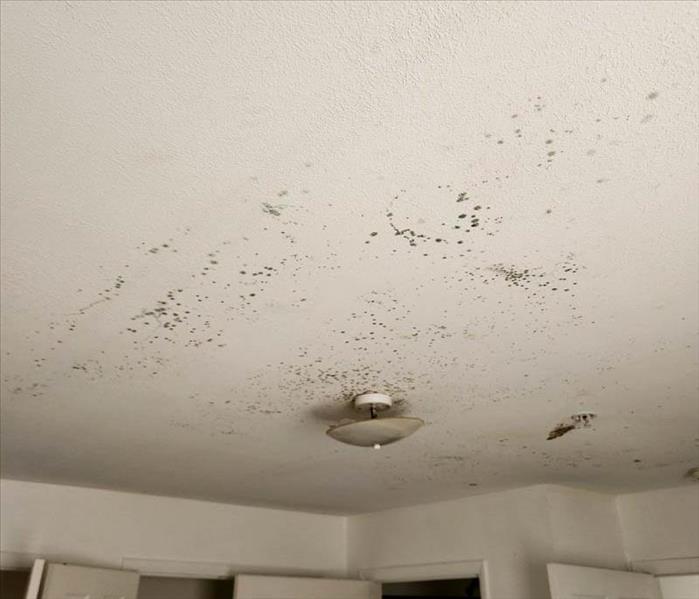 In Charleston, SC, mold issues are a common concern.
In Charleston, SC, mold issues are a common concern.
Living in Charleston, SC, mold growth is a common concern due to the humid coastal climate. Knowing when to handle mold removal yourself and when to seek professional help can be crucial after discovering a mold infestation in your home or business. In this blog, we'll delve deeper into the pros and cons of DIY mold removal and discuss the scenarios in which professional mold remediation is the best course of action.
DIY Mold Removal: Is it the Right Choice?
Many homeowners are tempted to tackle mold issues on their own, and there are some advantages to this approach.
Cost Savings
One of the primary reasons people opt for DIY mold removal is cost savings. Without incurring professional service fees, you might save money upfront.
Immediate Action
DIY mold removal allows you to take immediate action when you discover mold, preventing it from spreading and causing more damage.
However, there are significant drawbacks to consider when opting for DIY mold removal.
Incomplete Removal
DIY methods may not completely eradicate all mold spores, potentially leading to reinfestation. This can result from a lack of professional knowledge, inadequate equipment, or incorrect techniques.
Limited Expertise
Professionals possess the experience and knowledge to identify underlying causes of mold growth, such as hidden leaks or moisture problems. Without this expertise, you might miss these critical issues, allowing mold to return.
Potential Damage
Incorrect removal techniques or the use of harsh chemicals can damage surfaces, potentially leading to costly repairs.
When to Call the Professionals
While DIY efforts can be effective for small, isolated mold problems, there are situations where it's essential to call in the professionals. Here are some key indicators that it's time to seek expert help:
Extensive Infestation
If the mold problem has spread over a large area, professional assistance is necessary. Mold can grow rapidly, particularly in Charleston's humid environment, and tackling a significant infestation on your own can be overwhelming and ineffective.
Hidden Mold
Mold often lurks in concealed spaces like within walls, ceilings, or crawl spaces. Detecting and effectively addressing this hidden mold requires professional equipment and expertise.
Underlying Issues
If there are underlying problems causing mold growth, such as persistent plumbing leaks, poor ventilation, or high humidity levels, professionals can identify and address these issues. Solving the root cause is crucial to prevent mold from coming back.
Why Choose SERVPRO® in Charleston, SC
When selecting a professional mold remediation service in Charleston, it's important to choose a trusted, local company with the experience to handle mold issues in the area. At SERVPRO®, our team possesses the expertise and knowledge to address mold problems in our region effectively. We utilize industry-approved techniques and state-of-the-art equipment to ensure thorough mold removal and to prevent reinfestation.
In Charleston, SC, mold issues are a common concern, and understanding when to address mold removal yourself and when to call the professionals is important. While DIY methods can work for small, visible mold issues, professional mold remediation is the smart choice for extensive infestations, hidden mold, or underlying issues. If you're facing a mold problem, don't hesitate to contact SERVPRO® of South & West Charleston for expert assistance.
How Water Damage Can Affect Your Flooring
10/9/2023 (Permalink)
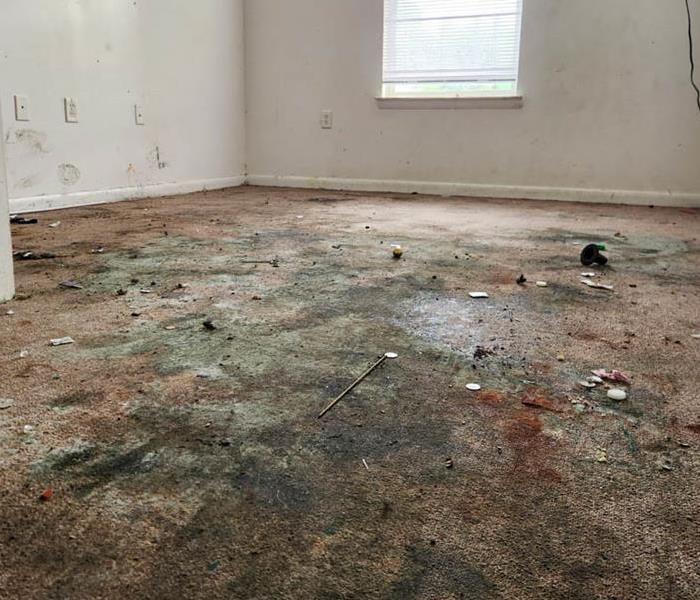 Water damage can wreak havoc on various types of flooring, from carpets to hardwood and tile.
Water damage can wreak havoc on various types of flooring, from carpets to hardwood and tile.
Water damage can wreak havoc on various types of flooring, from carpets to hardwood and tile. In this blog, we'll explore how water damage affects different flooring materials and provide valuable tips on prevention and restoration tailored to the Charleston community.
Water Damage and Carpets
Carpet flooring is a popular choice for its comfort and insulation properties, but it's particularly vulnerable to water damage. Moisture trapped in the carpet fibers can create a breeding ground for mold and mildew, which not only damages the carpet but also poses serious risks. Prolonged exposure to water can also cause the carpet's layers to separate, leading to irreversible damage. Lastly, a damp carpet can emit unpleasant odors, which can be challenging to eliminate without professional help.
Prevention and Restoration
- To prevent water damage, use water-resistant pads and seal seams properly during carpet installation.
- In case of water damage, contact SERVPRO® of South & West Charleston immediately for professional water extraction and drying services to salvage your carpet.
Water Damage and Hardwood Flooring
Hardwood floors add elegance to homes but require special care to prevent water damage. Excess moisture can cause hardwood planks to warp or cup, leading to an uneven and damaged surface. Water can also easily stain and discolor hardwood, making it look unsightly. Like carpets, hardwood floors can foster mold growth if moisture isn't addressed promptly.
Prevention and Restoration
- Ensure proper sealing and finish for your hardwood floors to create a protective barrier.
- If water damage occurs, contact SERVPRO® of South & West Charleston for immediate drying and refinishing to salvage your hardwood floors.
Water Damage and Tile Flooring
Tile flooring is relatively resistant to water damage, but it's not immune. The grout lines between tiles can absorb moisture, leading to mold and staining. Prolonged water exposure can also weaken the adhesive, causing tiles to come loose or crack. Lastly, water damage can cause mineral deposits to form on the tile surface, affecting its appearance.
Prevention and Restoration
- Regularly seal grout lines to prevent moisture penetration.
- In case of water damage, contact SERVPRO® of South & West Charleston for tile and grout cleaning and repair services.
Water damage can impact various types of flooring, but with proper prevention and immediate restoration, you can minimize the long-term effects. If your home or business in Charleston, SC, faces water damage issues, don't hesitate to contact SERVPRO®. Our expert team is here to help you restore and protect your valuable flooring investments. For more information or assistance, feel free to reach out to us today. Your floors deserve the best care, and we're here to provide it.
How to Managing Stress During Charleston's Storm Season
9/16/2023 (Permalink)
Charleston's picturesque beauty and rich history make it a captivating place to call home. Yet, alongside its charm, residents also experience the annual reality of storm season, which can trigger stress and anxiety. As clouds gather and winds intensify, it's essential to arm yourself with effective techniques for managing stress and maintaining a sense of calm. In this insightful guide, we'll explore expert strategies to help Charleston homeowners navigate storm season while prioritizing their well-being and peace of mind.
Stay Informed and Prepared
Staying informed about weather updates is crucial for minimizing stress during storm season. Regularly monitor reliable weather sources and mobile apps to track storm developments. Additionally, ensure you have a well-prepared emergency kit stocked with essential supplies such as non-perishable food, water, flashlights, batteries, and a comprehensive first aid kit. By taking these proactive steps, you can alleviate some of the uncertainty that often accompanies storm season.
Develop a Family Emergency Plan
Creating a comprehensive family emergency plan can provide significant reassurance during stormy times. Designate safe areas within your home where your family can seek shelter in case of severe weather. Establish a clear communication strategy, ensuring that everyone knows how to stay in touch, especially if power outages occur. This plan helps foster a sense of security and unity among family members, allowing you to navigate storm season with greater confidence.
Practice Stress-Relief Techniques
When the winds howl and the rain pours, practicing stress-relief techniques can be incredibly beneficial. Deep breathing exercises, for instance, can help reduce anxiety and promote a sense of calm. Engaging in mindfulness and meditation can keep you grounded and centered amidst uncertainty. These techniques can provide a calming respite, allowing you to manage stress and maintain emotional balance during stormy weather.
Create a Comforting Safe Space
Designating a cozy and comforting safe space within your home can offer solace during storms. Furnish this area with comfortable seating, soft lighting, and calming décor to create an inviting ambiance. Stock the space with books, puzzles, or other relaxing activities that can help divert your attention from worries. Having a dedicated safe haven can serve as a retreat where you can find tranquility and reduce stress during storm season.
Maintain a Support Network
Staying connected with your support network is essential for managing stress during stormy times. Share your concerns and worries with friends, family, and neighbors. Expressing your feelings can provide a sense of relief and foster a sense of community. Be open to offering and receiving help from others, as this mutual support can alleviate stress and strengthen bonds within your community.
Limit Media Consumption
While staying informed is important, excessive media consumption can intensify stress levels. Set specific times to check weather updates and news to avoid constant exposure to distressing content. Engaging in positive distractions, such as hobbies or activities you enjoy, can help shift your focus away from stressors and create a healthier balance in managing storm-related information.
Focus on Preparedness, Not Panic
Shift your perspective from panic to preparedness by educating yourself about storm preparedness and safety measures. Learning about the steps you can take to protect your family and property empowers you to feel more in control. Repeat positive affirmations that emphasize your proactive efforts and reinforce your ability to weather any storm that comes your way. By focusing on preparedness, you can alleviate stress and approach storm season with a calmer mindset.
Charleston's storm season may bring challenges, but with these expert strategies, you can effectively manage stress and maintain a sense of calm amidst the tempest. By staying informed, developing a family emergency plan, practicing stress-relief techniques, and fostering a strong support network, you can navigate storm season with resilience and peace of mind. Remember, your well-being is paramount, and by embracing these techniques, you can weather any storm that comes your way in Charleston.
Safeguarding Your Business: The Benefits of Commercial Property Insurance
8/13/2023 (Permalink)
As a homeowner or property owner, you understand the importance of protecting your properties, but have you considered the need to safeguard your business as well? Commercial property insurance provides essential coverage that can help mitigate financial risks associated with damage, loss, and liability. In this article, we will explore the numerous benefits of commercial property insurance, giving you a better understanding of why it is an invaluable investment for your business.
Protection against Property Damage and Loss
Commercial property insurance offers coverage for property damage caused by perils such as fire, vandalism, natural disasters, and theft. Whether it's your building, equipment, inventory, or furnishings, this insurance provides financial protection to repair or replace these assets in the event of damage or loss. This coverage can help ensure a swift recovery for your business, minimizing downtime and allowing you to get back on track quickly.
Liability Coverage
One of the significant benefits of commercial property insurance is liability coverage. Accidents can happen, and if someone is injured on your business premises, you may be held responsible. Commercial property insurance can provide protection against liability claims, including medical expenses, legal fees, and potential settlements or judgments. This coverage offers peace of mind, knowing that you have financial protection in case of an unfortunate incident.
Business Interruption Coverage
When unexpected events cause a halt in your business operations, the financial impact can be significant. Business interruption coverage, included in many commercial property insurance policies, provides reimbursement for lost income and additional expenses during the period of downtime. This coverage can help you cover ongoing expenses like payroll, rent, or loan payments, allowing your business to survive and recover from the temporary setback.
Coverage for Business Assets in Transit
If your business involves transporting goods or equipment, having coverage for property in transit is crucial. Commercial property insurance can extend coverage to protect your assets while they are on the move. Whether it's via land, air, or sea, this coverage ensures that your valuable business assets are protected against theft, damage, or loss during transportation.
Flexibility and Customization
Commercial property insurance policies can be tailored to suit the specific needs of your business. Whether you operate a retail store, office, warehouse, or any other type of commercial property, you can select coverage options based on the risks unique to your industry and location. With the flexibility to add additional coverage or endorsements, you can ensure that your policy provides comprehensive protection for your specific business assets.
Commercial property insurance is an essential investment for business owners, offering a range of benefits to safeguard your business against property damage, liability claims, and interruptions. Choosing the right coverage can provide peace of mind, knowing that your business assets are protected under unforeseen circumstances. Evaluate your business needs, consult with insurance professionals, and select a policy that best suits your requirements. With commercial property insurance in place, you can focus on growing your business, knowing that you have a safety net to rely on when the unexpected occurs.
Understanding Insurance Coverage for Different Types of Floods
7/13/2023 (Permalink)
Flooding can cause extensive damage to your property, leading to significant financial burdens. Understanding what types of floods your insurance policy covers is crucial for ensuring adequate protection. In this blog post, we will explore the different types of floods and shed light on the insurance coverage available for each, empowering you to make informed decisions to safeguard your home or business.
Natural Floods
Most standard homeowner's insurance policies do not cover natural floods caused by external factors such as heavy rainfall, hurricanes, or overflowing rivers. To protect your property from natural floods, you need separate flood insurance. The National Flood Insurance Program (NFIP) offers flood insurance coverage, and some private insurers also provide flood insurance policies. It is essential to evaluate your flood risk and consider purchasing flood insurance to ensure comprehensive coverage.
Plumbing or Appliance-Related Floods
Insurance policies typically cover water damage resulting from sudden and accidental incidents, such as burst pipes or malfunctioning appliances. If a pipe bursts in your home or your dishwasher leaks, causing a flood, your homeowner's insurance may cover the resulting damage, including water removal, repairs, and damaged personal belongings. However, coverage may vary, so it's important to review your policy and understand the specific terms and limitations regarding plumbing or appliance-related floods.
Sewer or Drain Backup
Sewer or drain backups can cause significant water damage to your property. While standard homeowner's insurance policies may not automatically include coverage for sewer or drain backups, you can typically add a sewer backup endorsement to your policy for an additional premium. This endorsement provides coverage for the damage caused by water backup from sewer or drain systems, helping you mitigate the financial impact of such incidents.
Water Damage from Roof Leaks
Roof leaks resulting from covered perils, such as storms or falling objects, may be covered under your homeowner's insurance policy. If the water damage is a direct result of a covered event, your insurance may pay for repairs to the roof and any resulting damage to the interior of your property. However, it is essential to review your policy and understand the specific terms, exclusions, and deductibles associated with roof leaks to determine the extent of coverage available.
Insurance coverage for floods depends on the type and cause of the flood. While natural floods require separate flood insurance, homeowner's insurance may cover water damage resulting from plumbing or appliance-related floods, sewer or drain backups, and roof leaks caused by covered perils. It is crucial to review your policies, assess your flood risk, and consider appropriate coverage to ensure comprehensive protection for your property.
 In this blog, we will highlight the importance of hiring certified professionals for fire damage restoration and discuss the benefits.
In this blog, we will highlight the importance of hiring certified professionals for fire damage restoration and discuss the benefits.

 24/7 Emergency Service
24/7 Emergency Service





